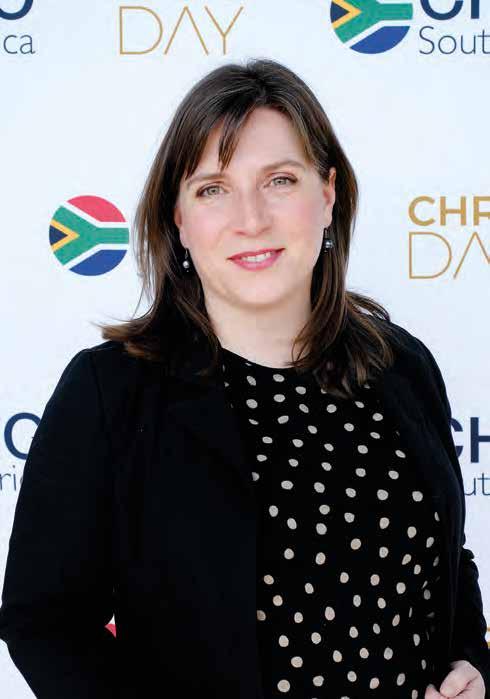
8 minute read
Prisoners, provocations and the SuperCFO
PRISONERS, PROVOCATIONS & THE SUPERCFO
Leading finance professionals gathered at Marble restaurant overlooking the bustling streets of Rosebank, Johannesburg, for CFO Day, where they shared unique insights, frank discussions and words of inspiration.
Advertisement
Global speaker Stephen McGown kicked off CFO Day on 11 May by sharing his story of being kidnapped from Timbuktu in 2011 and held as an Al Qaeda prisoner for over six years in the Sahara desert.
Attendees were brought to tears as he recounted his journey and related how he had to do his best to be positive in the face of great adversity during his six years of captivity. Guests were then encouraged to change their seats and mingle with new peers – a CFO Day tradition – while poetry band Puns ‘n Things sang about superheroes with capes made of spreadsheets, encouraging the audience to have hope. Next up was Jordaan Burger, vice president: finance, Sage AMEAP, who stressed that hiring the right people is vital. “The hiring aspect [in an automated world] is important. We need a technologically savvy workforce. We need to get away from crunching the numbers all the time and focus on telling the story. People have this fear that automation will take a lot of things away from us,” he said. Sayuri Govender, reporting and analytics group head at Standard Bank, noted that the Covid-19 pandemic had accelerated the company’s automation strategy. “The point is to take the manually intensive nature of the work we have to do to give us back the time that we need to tell the right story. We encourage our people to be future ready by creating learning as key magic,” she said. Dineo Molefe, CFO at MTN, said it was important for companies to identify the drivers and understand the context of the business.
“We need to continue to challenge ourselves on how we are creating value and empower our teams to drive the right conversations. We have to wear the hat of the CEO even though the hat is not with us,” she concluded.
Do good
During the insightful session on ESG, Nedbank CFO Mike Davis said, “Most of us think of ESG as climate change, but there’s a reason why there are three letters in the acronym.” He explained that, for finance professionals, the easiest of the three letters to understand is governance. “This talks to the board and exco compositions, frameworks, policies, practices, transformation, and remuneration, all of which is how you structure the organisation to effectively manage not only the business, but the environmental and social aspects of ESG as well.” Ascendis Health CFO and interim CEO CJ Kujenga added, “Often, problems that manifest themselves as numbers come from much deeper than that and root down to the decisions we make.”
Hulisani CFO and interim CEO Masibulele Dem, added, ““We talk about ESG in the context of business, that it is a commercial imperative. But we need to look at it from a much higher level – as a life imperative. We live on this beautiful earth, and the extent at which we are able to sustain it is the extent to which we as humanity are able to survive and exist.”
Mike noted that ESG was not just “a nice to have” but has to be a long-term sustainable goal, “part of the culture and purpose of the organisation”. Masibulele further stated that CFOs hold powerful and influential positions in businesses, and this gives them a golden opportunity to contribute to something that is truly meaningful.
Digital innovation
Lafarge's former CFO Clarissa Appana gave attendees insight into the strides being made in digital innovation.
“The pace of digital innovation and the speed of execution are some of the key challenges we are facing. One of the solutions we are trying to implement at Lafarge is to break down these bigger projects to get them within a shorter turnaround time. The way we would approach this is to lower the threshold, breaking it into many projects and somehow lower the approval levels,” she said.
The company has moved to a contactless, paperless way of work on its construction sites, to address missing paperwork and keep track of delivery notes, and is also trying to get transporters to buy into the real-time online tracking of trucks, loads and raw materials coming in. Clarissa added, “We are not moving fast enough in terms of innovation, but we are getting there. The culture we want to see is that it’s not just easy to succeed all the time. It’s okay to fail because you can have some lessons from that. We want to ensure that we are creating this environment that feels safe for people.”
Saving sinking ships
Eskom CFO Calib Cassim and Starbucks South Africa CFO Adrian Maizey provided attendees with unique insight on turning around their companies.
THE TOP FOUR THINGS CEOs LOOK FOR IN A CFO
BCX founder and Randvest chairman Isaac Mophatlane, Telkom CEO Serame Taukobong, as well as ACCA South Africa and remote markets head Portia Mkhabela gave their four personal leadership lessons from the top during CFO Day. 1. A strategic business driver: Serame explained that he looks for a partner to help him drive the strategic direction of the business. “The CFO is like the heart of the organisation. His job is to pump blood across the entire body. The CEO is the brain of the body, and needs to inform the heart where to pump the blood. So it's important for the CEO and CFO to figure out how they can work together for the body to perform at its best.” 2. Don’t be a “yes man”: Isaac believes that the CFO should be the conscience of the business. “Once you have a CFO that’s a yes man and just gives you the numbers that you are looking for, it becomes a problem.” 3. Be vulnerable: Portia said that, as a woman leader, you need to always make sure you don’t neglect your feminine touch. “At the same time, however, you need to make sure that your teams and other leaders don’t take advantage of it. So we need to be strong when we make decisions, but drive them with compassion.” Serame agreed, and believes that the same should apply to men. “Allow yourself to be vulnerable and open. The one thing we forget as leaders is that we are also human. It’s okay to be vulnerable and say I don’t know, or to ask for help. It allows people to engage with you on a much more honest and personal level.”
4. Be inclusive: Isaac believes that CFOs need to surround themselves with a diverse finance team. “It’s important to have different points of view when you are making decisions. Just as much as you lead your team, they need to be able to lead you towards making the right decisions.”
CFO Day was held in partnership with Momentum Corporate, Workday, ACCA, Coupa, Ince, Kyriba, SoluGrowth & Transparent.

Calib said his first decision in the CFO role was not to compromise his values or morals, and to do the right thing. In the first week, one of the then-executives of Eskom came to Calib and said they had a solution for the power utility’s liquidity. “There was no paper trail and it would have cost us R400 billion. So I said no way, despite the severe pressure from everyone to sign,” he said. Calib explained that from August 2017 to January 2018 Eskom didn’t raise a single cent in either the domestic or international markets. “We needed to start by developing new credibility with our lenders, but to gain trust isn’t easy. You can’t buy it, you have to earn it,” he said. At the beginning of February 2018, Calib looked at the balance sheet and realised that Eskom would run out of cash and go into default within 30 days. Because of the credibility the new chairman and Calib had created in preceding months, the banks gave them the funds they needed. And, through the continued development of Eskom’s credibility, the power utility currently has enough cash flow for three to four months. However, Calib explained that they are certainly not out of the woods yet.
Driving a speedboat
His first course of action, after buying 13 Starbucks, was to reduce the corporate overhead and move to smaller store formats in lower rental areas outside of malls. Just over two years later, having ploughed through macro interruptions including the Covid-19 pandemic, looting, metal worker strikes, as well as rolling electricity and water blackouts, 42 new Starbucks were opened, bringing its total of stores to 55.
“I don’t think we would have expanded at this rate were it not for Covid-19, as the landscape would not have been as opportunistic as it was,” he says. “The markets imploded, and we went out there looking for new retail space while the rest of the market was retreating and anchoring down in preparation of the storm that was coming. While our growth has been out of necessity, our rate of growth has been out of opportunity. We moved early and fast.” After these insightful panel discussions, strategist and disruptor Abdullah Verachia’s took the stage to lay some provocations on the table. He said that, as the canvas of business environments have changed, so too have the colours of decision making and the skills of the finance painters. Abdullah said, “When you’re at a senior level, sometimes you have to look at the society that you live in and ask the hard question: ‘how do we in some way have a deeper impact beyond our organisation?’.”l

Serame Taukobong


Adrian Maizey Calib Cassim













